8. Europe
Many of the countries in Central and Eastern Europe and the European region of the former Soviet Union that had previously been under communist systems have subsequently achieved democratization and liberalization. They are currently pursuing economic development based on market economies under democratic administrations. Japan has provided assistance for efforts such as the transition to market economies, reconstruction of economic infrastructure, and addressing environmental issues. The aim is to further promote stability and development in these regions and in Europe as a whole, as well as to build relationships based on shared universal values (human rights, democracy, market economy, and rule of law).
< Japan’s Efforts >
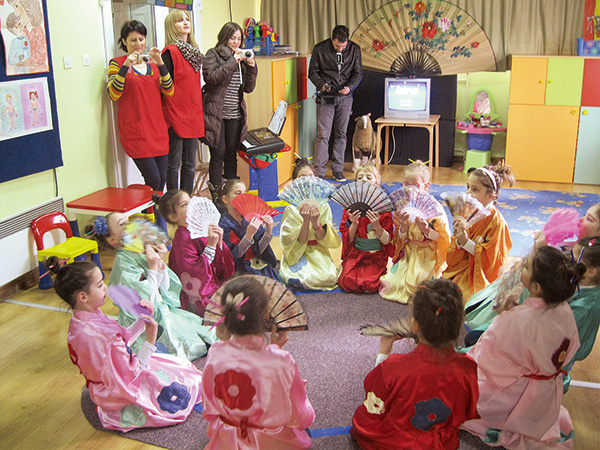
Children of the Preschool of Zagorka Ivanović in the city of Cetinje in the western part of Montenegro sing and dance dressed in yukata at the handover ceremony. (Photo: Ivan Vatovic / Embassy of Japan in Serbia)
Reforms had once slowed in the Western Balkans(Note 12) due to the impact of conflicts which occurred in the 1990s. However, assistance from donor countries and international organizations, as well as their own efforts for reform, have enabled them to graduate from the stage of receiving aid for reconstruction. Currently, they are at a stage where they require assistance aimed at sustainable economic development. Japan has provided assistance on the three main pillars of “consolidation of peace,” “economic development,” and “regional cooperation” that were confirmed at the Ministerial Conference on Peace Consolidation and Economic Development of the Western Balkans jointly held by Japan and the EU in 2004, as its priority areas for development cooperation. Japan also continues to provide assistance with the “consolidation of peace and ethnic reconciliation” and “addressing environmental and climate change issues” as its particular priority policies.
Ukraine and Moldova, part of the former Soviet Union, are geographically important, both politically and diplomatically, since they are located between Russia and the EU. The stability and sustainable development of these countries are indispensable for the stability of Europe as a whole. Japan assists in their efforts to consolidate democracy and establish market economies. In this connection, in response to the worsening situation in Ukraine since February 2014, Japan announced and is steadily implementing assistance amounting to approximately $1.84 billion, which is the largest scale on an individual country basis, to support Ukrainian reforms. In addition, in response to the political crisis as well as the intensification of the activities of separatists in eastern Ukraine and other areas, Japan provided approximately $6 million for the “Project for Early Recovery of Social Services and Peace-building in Donetsk and Luhansk Oblasts,” and approximately $16.6 million to provide humanitarian assistance and infrastructure restoration assistance in eastern regions.
In light of disparities in economic development in Europe, Japan gradually reduces assistance to new EU member countries, deeming them as having graduated from ODA, and encourages them to become donors to provide development cooperation to less developed countries in Europe. Japan also carries out initiatives with these countries, including the Visegrad Group,(Note 13) to share Japan’s experience as a donor. At the same time, Japan continues to provide appropriate support to the less developed countries like those of the Western Balkans and Ukraine, considering their economic levels. In addition, regardless of the country receiving the aid, Japan focuses more on results, and effective and efficient aid by utilizing Japan’s knowledge and experience, while paying attention to the activities of other donor countries and international organizations.
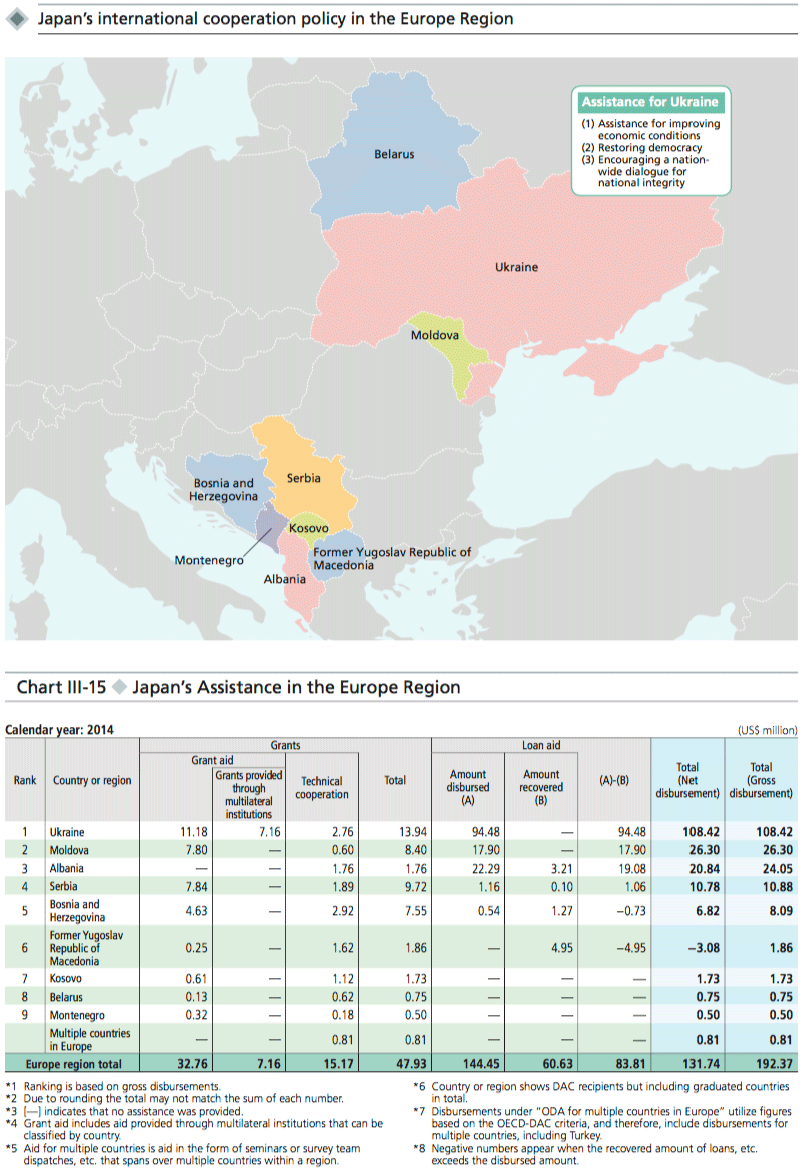
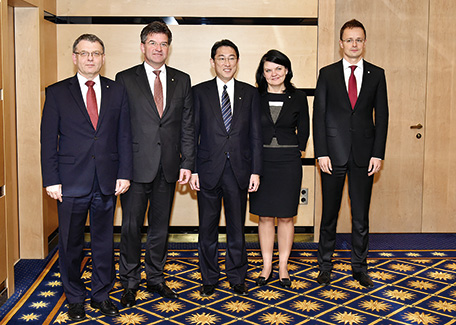
From left, Mr. Lubomír Zaorálek, Minister of Foreign Affairs of the Czech Republic, Mr. Miroslav Lajčák, Deputy Prime Minister and Minister of Foreign and European Affairs of the Slovak Republic, Mr. Fumio Kishida, Minister for Foreign Affairs of Japan, Ms. Katarzyna Kacperczyk, Deputy Foreign Minister of the Republic of Poland, and Mr. Péter Szijjártó, Minister of Foreign Affairs and Trade of Hungary, attended the meeting.
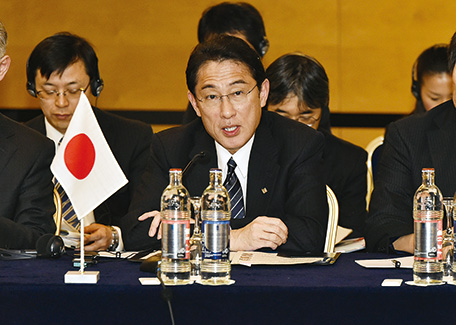
Minister for Foreign Affairs Fumio Kishida visited Luxembourg in November 2015, and attended the 6th Meeting of Ministers of Foreign Affairs of the Visegrad Group (V4) plus Japan.
- Note 12: Western Balkans: Albania, Bosnia and Herzegovina, Croatia, Former Yugoslav Republic of Macedonia, Kosovo, Montenegro, and Serbia
- Note 13: Countries of the Visegrad Group: Czech Republic, Hungary, Poland, and Slovakia
Bosnia and Herzegovina
Project for Informatics Curricula Modernization Phase 2
Technical Cooperation Project (October 2010 – August 2014)
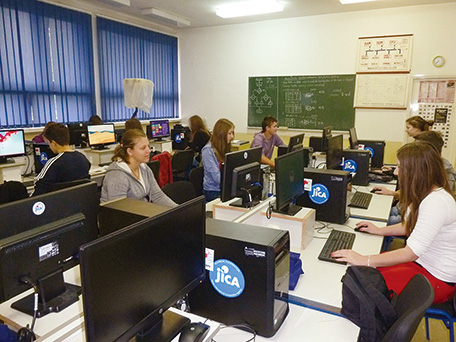
An “information” lesson at a pilot high school conducted using shared textbooks created through technical cooperation. (Photo: JICA)
Bosnia and Herzegovina gained independence following the breakup of the Socialist Federal Republic of Yugoslavia in 1992, but experienced many years of civil war and ethnic conflict. This conflict came to an end in 1995 with the signing of the Dayton Agreement. However distrust between ethnic groups remains deeply rooted. In order to improve ethnic relations, Bosnia and Herzegovina has engaged in educational reform and promoted common core curriculum. This is led by collaborative efforts among education officials from all three ethnic groups (Bosnians, Croatians, and Serbians), and encouraged by the Organization for Security and Co-operation in Europe.
The Government of Japan has also assisted with this common core curriculum. Japan introduced the IT curriculum for Japanese first-year high school students on a trial basis in a local pilot school from 2006. Students of different ethnic backgrounds all took part in these IT classes together. Until then, students used different curricula, classrooms and textbooks based on their ethnic background. The fact that students were now learning in the same classroom together was a significant change.
The activities at the pilot school were highly appraised, and information about them spread. At the request of the Government of Bosnia and Herzegovina, Japan implemented the Project for Informatics Curricula Modernization at 18 pilot schools from 2008 to 2010. In phase two from 2010, this project was implemented at all general high schools in the country.
Japan dispatched a number of experts to Bosnia and Herzegovina. There they helped to revise the IT curriculum. For example, they translated the teaching materials for the IT A and IT B subjects into the three ethnic groups’ languages. Japan also cooperated with providing the necessary equipment for IT instructors and PCs for students. Fifteen IT instructor leaders from Bosnia and Herzegovina took part in a number of training sessions in Japan, where they observed and learned about education in Japan.
Students are now all learning together, using the IT curriculum provided by Japan. This is helping to improve relations among the students and instructors of the three ethnic groups, which in turn is contributing to peace and stability in Bosnia and Herzegovina. (As of August 2015)
